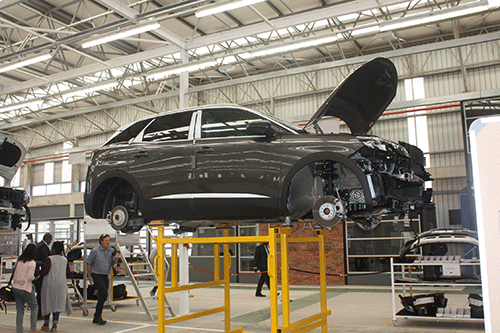Workers at the Peugeot plant in Walvis Bay, in which government owns a 49% stake and French automaker Groupe PSA has a majority 51% share, continue receiving their basic salaries and locally assembled vehicles are still being sold domestically despite the factory being under care and maintenance. This is after the French car maker sued government for N$80 million, claiming government’s failure to honour its part of the investment agreement as it pertains to the establishment of Peugeot Opel Assembly Namibia (POAN).
“We continue selling the cars. We sold of the vehicles about two weeks ago. And, we continue paying people on the ground their basic salaries and are still fine to do that for the next year,” said Michael Humavindu, deputy executive director in the trade and industrialisation ministry. The N$190 million assembly plant, which holds tremendous export and job creation potential, has been besieged by obstacles since its official opening in 2018. This has resulted in less than 200 vehicles being produced at the plant since inception. The carmaker has been left regionally uncompetitive due to import duties of between 18% and 25% into the Southern African Development Community (SADC) and the Southern African Customs Union (SACU). However, government refuted Groupe PSA’s legal assertion with what Humavindu called “evidence and facts” and this resulted in the court striking the case from the roll. According to court instructions, the investment agreement between Groupe PSA and government makes provision for disputes to be resolved internally. This means the two parties need to exhaust all possible avenues to resolve the dispute amongst themselves.
“We do not see the court’s decision as a victory because we were never interested in fighting our fellow shareholder. We are just trying to set things right and show that government never failed to honour its obligations in terms of that investment agreement,” said Humavindu in response to a New Era query. Humavindu added that discussions around the contentious issue are taking place, even at the African continental level “which means at this stage these things are very sensitive”. He continued that government hopes for an optimal outcome going forward.
In court documents, the French automaker argues the alleged failure of the venture stems from the Namibian government not ensuring POAN’s exemption from excise and customs duties, taxes, and levies for exporting assembled vehicles to SACU and SADC.
The agreement was signed in February 2018, with the Namibian government, represented by the Namibia Industrial Development Agency (Nida) and the trade and industrialisation ministry. The joint venture is aimed to promote local vehicle assembly and create jobs, while boosting Namibia’s automotive industry.
Groupe PSA contends the Namibian government failed to meet its obligations, despite numerous opportunities to do so, citing over 20 meetings with SACU’s Council of Ministers and the Protocol on Trade in the SADC region. Groupe PSA’s lawsuit alleges government’s inaction left POAN unable to compete against other vehicle manufacturers, unable to pay for Semi-Knocked Down (SKD) vehicle components, or cover its normal operating expenses. As a result, Peugeot terminated the agreement under clause 8(3), demanding the Namibian government purchase the company’s stake in POAN for N$80 million. This represents Groupe PSA’s total unrecovered investment in the project, including initial share capital, research and development costs, and unpaid invoices for supplied SKD components.


